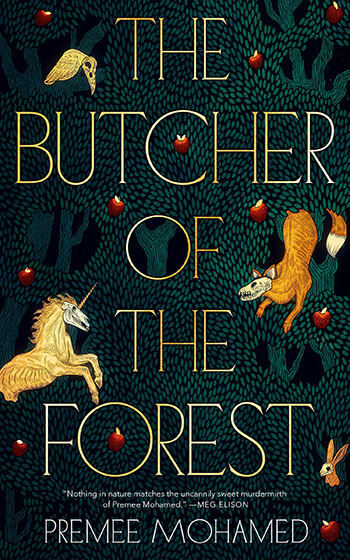“I have returned. I am one known to you. Please allow me safe passage to bring back those who are lost.”
Author Premee Mohamed takes a new look at a familiar fairy tale trope (two children lost in the woods) in her new book The Butcher of the Forest, a frightening combination of horror and fantasy with a generous dose of real-life trauma from war.
Everyone knows not to go into the Elemever. Even the Tyrant, a warlord who’s caused the deaths of millions and keeps the tiny village at the edge of the forest terrified and under his control, even he knows that people who walk into the woods are usually never seen again. But too many children are told “don’t” and instead hear “maybe just this once…”. So when the Tyrant’s two children – nine-year-old heir to the throne Eleanor, and her younger brother Aram – go missing from the castle and their trail ends at the woods, the Tyrant has his soldiers bring him the one person who might have a chance at finding them.
Veris isn’t anybody’s idea of a hero or an adventurer, least of all her own. She’s nearing forty, having spent the last couple of decades living a quiet life with her aunt and grandfather after the death of her parents due to one of the Tyrant’s many wars. But she’s also the only person in living memory who’s gone into the Elmever and brought a missing child out alive. She still has nightmares about the experience, but as the Tyrant’s only chance at rescuing his children she doesn’t have a choice. This is a man who slaughters whole battalions of his own men for not winning a battle fast enough; even trying to ask for something for her village in return turns out to be a really bad idea.
“You dare, you worm, filth, you ask anything of me? If you do not recover my children your village will be razed to the ground and burnt, and we will roast your people alive upon it and eat them.”
Knowing that she only has a day to bring the children out of the woods before they’re lost for good, and with two of the Tyrant’s guards posted at her aunt and grandfather’s house to make sure she won’t have anything to come back to if she returns without them, Veris sets off into the Elmever for the second time in her life. She has no fighting skills, and no magical talents. What she does have is a handful of small good-luck tokens, and a lifetime of learning what one should and definitely should not do when inside the woods.
The rules were vague but should not be broken: don’t cut living wood; don’t shed any animal’s blood; trade if you must, but do not negotiate. And certainly never accept any “gifts”.
Premee Mohamed paints a picture of a beautiful forest that’s filled with more and more dread and menace the further Veris walks inside. Everything she encounters is one more thing that’s trying to kill her or imprison her or at the very least stall her until it’s too late to find the children and get them back in time to save her village. Conversations are chess matches where she has to watch every word to make sure she’s not agreeing to anything, not accepting anything she doesn’t actually want, and for heaven’s sake don’t let anyone know your name. (Names are very important. The Tyrant has none in this story, and the theft of names from people trapped in the forest turns them from people into things.) And even if Veris was someone who could be charmed by things like talking birds and magical creatures and an enchanted hut in the middle of a sunny glade, the Elmever has many, many more things that are even worse than the worst fate you can have in a Grimms fairy tale.
The mouth moved out of habit, the teeth ground out of habit, but the dead deer would never eat again.
This story is bloody and violent, with nightmarish images and nail-biting tension as Veris and the Tyrant’s children race to escape the forest. There are moments of humor, and quite a lot of tragedy, but the overarching theme I found here is guilt. And not the guilt of the perpetrators, but the guilt of the victims. The author has tapped into a horrible contradiction: the traumatized are the ones who second-guess themselves and their worth over and over again. Did my mistake cause this? Did I do something to deserve this? Did I not do enough to stop this? Veris has to keep reminding herself that, even though the children wandering where they shouldn’t have is what brought her into this mess, and even though their father has brought about the deaths of thousands, they can’t be blamed even though the world is so focused on blame that it feels natural for innocent children to be held responsible for the horrible actions of warlords and monsters.

I’m going to throw in a trigger warning for memories of wartime atrocities. Veris has gone through a lot, and there’s no fairy godmother deus ex machina to sweep in and give everyone a happily-ever-after. If there’s any hopeful notes here, it’s that life keeps going, on and on whether we want it to or not, and Veris’s own decision to not blame the innocent means that there’s the tiniest chance that things one day might get better.